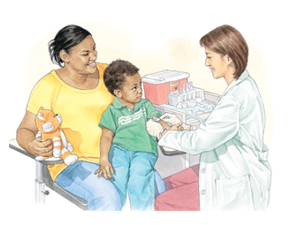When Your Child Has Itp [Immune Thrombocytopenia Purpura (ITP)]
Immune Thrombocytopenia (ITP)
ITP is an immune problem that affects platelets. Platelets are blood cells that help the blood to clot. When there is a cut or injury, platelets come together to form a clot or “plug” to stop the bleeding. ITP is a disorder where the body’s immune system makes proteins, called antibodies, which attack and destroy normal platelets. This may lead to more bleeding or bruising than normal. The cause of ITP is not known.
ITP has two groups:
- Acute ITP: the first 12 months after diagnosis, which is most common.
- Chronic ITP: lasts more than 12 months from the time of diagnosis. Sometimes this is caused by underlying immune system disorders.
What are the symptoms?
Each child’s symptoms are different but may include:
- Rash with small purple or red spots, called petechiae.
- Bruising.
- Nosebleeds.
- Bleeding gums.
- Petechiae or blood blisters in the mouth.
- Heavy periods .
- Blood in urine or stool.
- Bleeding inside the brain. This is rare. Signs may include: a bad headache that does not get better, being very tired, vomiting that does not stop, unsteady balance, slurred speech, confusion, or seizures.
How is ITP diagnosed?
The doctor will do an exam and ask you questions about your child’s symptoms and health. Tests will also be done. A blood sample will be taken from a vein in the arm. Tests may include:
- A complete blood cell count (CBC). This test measures platelets and other types of blood cells.
- A blood smear. This test checks the sizes and shapes of the cells.
How is ITP treated?
Treatment depends on your child’s platelet count and symptoms. Your child will be seen by a doctor who specializes in bleeding disorders, called a hematologist. The hematologist will talk with you about the best options for treatment.
Treatments
- Observation. Often, no treatment is needed, and your child will be observed carefully for bleeding symptoms.
- If treatment is needed, it may include:
- Steroids (often prednisone) help the immune system to stop attacking the platelets. This is an oral medication that can be taken at home.
- Intravenous immune globulin (IVIG) helps the body to stop destroying platelets. This medicine is given through an IV, and your child will be watched carefully at the hospital or clinic.
- Rituximab destroys the cells which make the antibodies to attack platelets. This medicine is given through an IV, and your child will be watched carefully at the hospital or clinic.
- Thrombopoietin mimetics. Promacta (Eltrombopag) or NPlate (Romiplostim) activate the bone marrow to make more platelets. They do not stop the antibodies from destroying platelets.
- There are other medicines to help raise the platelet count, many by quieting the immune system.
- Rarely, surgery may be done to remove the spleen. The spleen is thought to be the site where the platelets are being destroyed.
What are the concerns for future problems?
Most children with ITP get better without further problems. Children with chronic ITP may need regular treatments and visits to the clinic. The hematology team will watch your child’s labs closely. The following are important rules to follow to reduce the risk of bleeding and possible complications:
- Limit physical activities to lessen the risk of bleeding and head injury. Watch toddlers closely so they don’t climb or fall.
- Avoid contact sports. Your child also should not do things like dive, skateboard, climb to high places, or play roughly. These
- could cause injury and trauma to the head. Activities like running and swimming are fine as they are less likely to cause injury.
- Wear a helmet for biking. Kids should bike only on low traffic streets.
- Avoid medicines such as: Aspirin, Ibuprofen, Motrin®, Advil® or other medicines that include these drugs. They should not be
- used when the platelets are low because they make platelets less sticky. You may give your child Acetaminophen (Tylenol®) for
- fever.
Please call your child’s hematology team if your child has:
- Minor bruising and petechiae on the skin are common. Call if there is a sudden increase.
- Blood blisters or bleeding in the mouth.
- Severe headache.
- Any injury to the head.
- Blood in the urine or stool.
- Menstrual bleeding lasting more than several days, or needing to change protection more often than every 3 hours.
- Problems walking or using their hands or legs.
- Slurred speech.
- Vomiting that does not stop.



